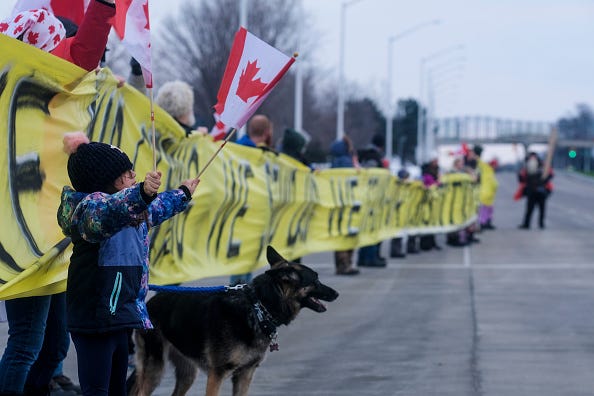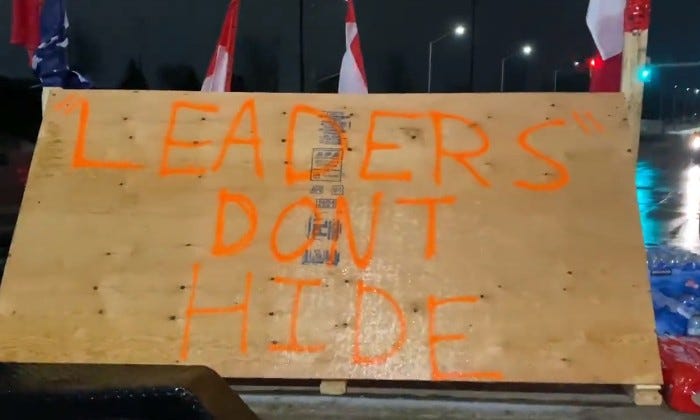
DETROIT (WWJ) - A Canadian judge has granted an injunction against COVID protestors who have choked off commercial traffic between the U.S. and Canada at the Ambassador Bridge for the fifth day, causing massive disruptions of traded goods between the two countries.
Chief Justice Geoffrey Morawetz ordered demonstrators to clear access to the vital bridge starting at 7 p.m. Friday night.
Authorities are expected to return to the Canadian court this evening to further discuss what the injunction will entail. At this time, it remains unclear when and if police will remove the protestors who have parked 18 wheelers across both lanes of traffic to and from the Ambassador Bridge.
Ontario had declared a state of emergency earlier Friday due to the unfolding economic crisis the blockade is causing the region.
Premier Doug Ford announced his declaration during a news conference Friday morning, and said those who impede the movement of goods, people and services will face a fine of $100,000 and a year in jail.
Ford said the world is watching the ongoing standoff in his province, and declared that the ongoing blockade is not what "Canada is about."
"We will also provide additional authority to consider taking away the personal and commercial licenses of anyone who doesn't comply with these orders," added Ford. "This will not impede the rights of Ontarians to peacefully protest -- it will provide additional tools to help stop the illegal occupation of Ottawa and the Ambassador Bridge in Windsor."
This declaration comes on the heels of an agreement made between protestors and police to partially open the Ambassador Bridge, after blocking the border crossing for four days.
"The trucks were blocking all of the lanes coming into Canada from Detroit. Now the decision has been made by leadership here to at least allow one lane from the U.S. into Canada," WWJ's Charlie Langton reported, shortly before 10 a.m. Friday.
"A group, they got together and decided as an act of goodwill, those are their words, they want to show support and a willingness to perhaps worth with the government here."
Windsor Mayor Drew Dilkens vowed on Thursday to end the major road blockade set up by COVID-19 protestors that has crippled international trade at the bridge — a vital artery for commercial operations between Canada and the United States.
Dilkens told reporters in a press conference that he sought an immediate injunction before a Superior Court of Justice judge to remove demonstrators that have lined up and blocked bridge access in both directions.
Langton reported that a judge was expected to rule on that injunction Friday afternoon.
The closure has severely affected the supply chains of automotive manufacturers, agriculture commerce and other businesses in Michigan and Ontario that rely on the critical trade route.

“We cannot allow this lawlessness to continue to happen," Dilkens stressed, during a Thursday afternoon news conference. He estimated that the border disruptions have impacted roughly $400 million worth of goods every day since the protests started over the weekend.
All this week truckers have been backed up for miles in Detroit as the Ambassador Bridge was forced to close to commercial traffic. Lanes were clogged with truckers along I-96 and I-75 who had been fighting heavy traffic in previous days in an attempt to get across the Detroit River when the bridge was operating on a delay for commercial vehicles entering Canada -- many had been stranded without food and water.
WWJ's Mike Campbell spoke with truckers who had been helpless while waiting in line since Monday, many of which were Canadian and were unable to get back to their homes across the river.
"We don't have food. I talked to other drivers and they are hungry and they're wait it out, hoping any minute now someone is going to say 'OK! Everything is back to normal', but it's not," Canadian trucker Terry Cone said.
"It's very frustrating."
Opposite traffic flow from Windsor into the U.S. was not affected until Thursday morning after "frustrating" attempts by police to negotiate with protestors. The mayor of Windsor said the movement -- dubbed the "Freedom Convoy" -- is leaderless and agreements authorities made with one group of protestors to keep traffic flowing from Windsor to Detroit was not honored by another group who took "siege of entrance" and shut the Ambassador Bridge down completely Wednesday night.
While the mayor stressed that all involved hoped for a peaceful resolution, he said the economic harm to Canada and the United States was “not sustainable and must come to an end.”
Gov. Gretchen Whitmer offered to send heavy equipment to help authorities remove the truckers to allow commercial traffic to resume immediately, Dilkens said.
Whitmer called on the Canadian mayor on Thursday afternoon in a press release, demanding Dilkens speedily resolve the ongoing Ambassador Bridge closure.
"It is imperative that Canadian local, provincial, and national governments de-escalate this economic blockade," the governor urged.
"They must take all necessary and appropriate steps to immediately and safely reopen traffic so we can continue growing our economy, supporting good-paying jobs and lowering costs for families."
The governor called the Ambassador Bridge the "busiest land border crossing in North America," with hundreds of millions of dollars worth of goods traversing the bridge every day.
Whitmer said Michiganders heavily depend on the efficient flow of goods for their businesses and their livelihood.
As for what they want, demonstrators said they are opposed to vaccine mandates the Canadian government put into place for unvaccinated truckers crossing at international borders, and would not move until those mandates were lifted.

Under the mandates in effect since Jan. 15, truckers coming into Canada who are not current on their third COVID vaccine booster will be subjected to a COVID test and a mandatory two week quarantine.
The U.S. passed a similar rule on Jan. 22.
Officials representing production and automotive interests in Canada said the protests have disabled the automotive industry in the region -- still reeling from the pandemic -- as General Motors, Ford, Stellantis and other major plants rely on the route for the delivery of essential parts.
GM was forced to shut down second shift operations Wednesday night at its SUV plant in Lansing over shortages due to the protests in Windsor. Plant managers also told first shift employees to stay home Thursday morning.
“We are working closely with our logistics providers to mitigate any potential impacts to our production and operations,” Erin Davis, a communications representative with GM said to WLNS on Wednesday.
Brian Kingston, President and Chief Executive Officer of the Canadian Vehicle Manufacturers' Association, said the bridge must be reopened immediately, calling it "absolutely critical to the automotive industry" and "no other bridge can handle the capacity of goods" that traverse between Detroit and Windsor.
Mayor Dilkens called the closure of the Ambassador Bridge an "illegal blockage." In his press conference, the mayor said he was confident that the injunction will be in the hands of police and measures have been made to secure federal and provincial support to enforce peace and order as soon as possible.
“You are not welcome here," the mayor said to protestors who might be thinking of joining the already tense border crisis.
There is currently no word on when the Ambassador Bridge might fully reopen. Detours from the bridge in Detroit have caused miles-long backups at the Blue Water Bridge in Port Huron as truckers desperately tried to get through.
Those who do not want to wait only have two other options -- either drive 350 miles north and cross the bridge in the Sault Sainte Marie in the Upper Peninsula or to travel almost 400 miles around Lake Erie and cross over the Canadian border at Peace Bridge in Buffalo or at Niagara Falls, New York
The Peace Bridge at New York-Canadian border has already reported delays as trucks made the trek over from Detroit, according to WGRZ in Buffalo.
Personal vehicles are still able to take a second border crossing from Detroit to Canada through the Windsor Tunnel, connecting the two cities under the Detroit River.
Commercial vehicles are not authorized in the tunnel.
This is a developing story. Listen to WWJ live for the most current updates as they become available.
